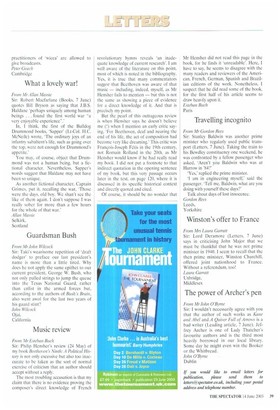Music review
From Mr Esteban Buch Sir: Philip Hensher's review (24 May) of my book Beethoven's Ninth: A Political History is not only excessive but also too inaccurate to be taken as the sort of normal exercise of criticism that an author should accept without a reply.
The most troubling accusation is that my claim that there is no evidence proving the composer's direct knowledge of French
revolutionary hymns reveals 'an inadequate knowledge of current research'. I am well aware of the literature on this point, most of which is noted in the bibliography. Yes, it is true that many commentators suggest that Beethoven was aware of that music — including, indeed, myself, as Mr Hensher fails to mention — but this is not the same as showing a piece of evidence for a direct knowledge of it. And that is precisely my point.
But the pearl of this outrageous review is when Hensher says he doesn't believe me (?) when I mention an early critic saying, 'For Beethoven, deaf and nearing the end of his life, the act of composition had become very like dreaming.' This critic was Francois-Joseph Fens in the 19th century, not Romain Rolland in the 20th, as Mr Hensher would know if he had really read my book. I did not put a footnote to that indirect quotation in the opening sentence of my book, but this very passage occurs later in the text, on page 120, where it is discussed in its specific historical context and directly quoted and cited.
Of course, it should be no wonder that
Mr Hensher did not read this page in the book, for he finds it 'unreadable'. Here, I have to say, he seems to disagree with the many readers and reviewers of the American, French, German, Spanish and Brazilian editions of the work. Nonetheless, I suspect that he did read some of the book, for the first half of his article seems to draw heavily upon it.
Esteban Buch Paris


































































































 Previous page
Previous page